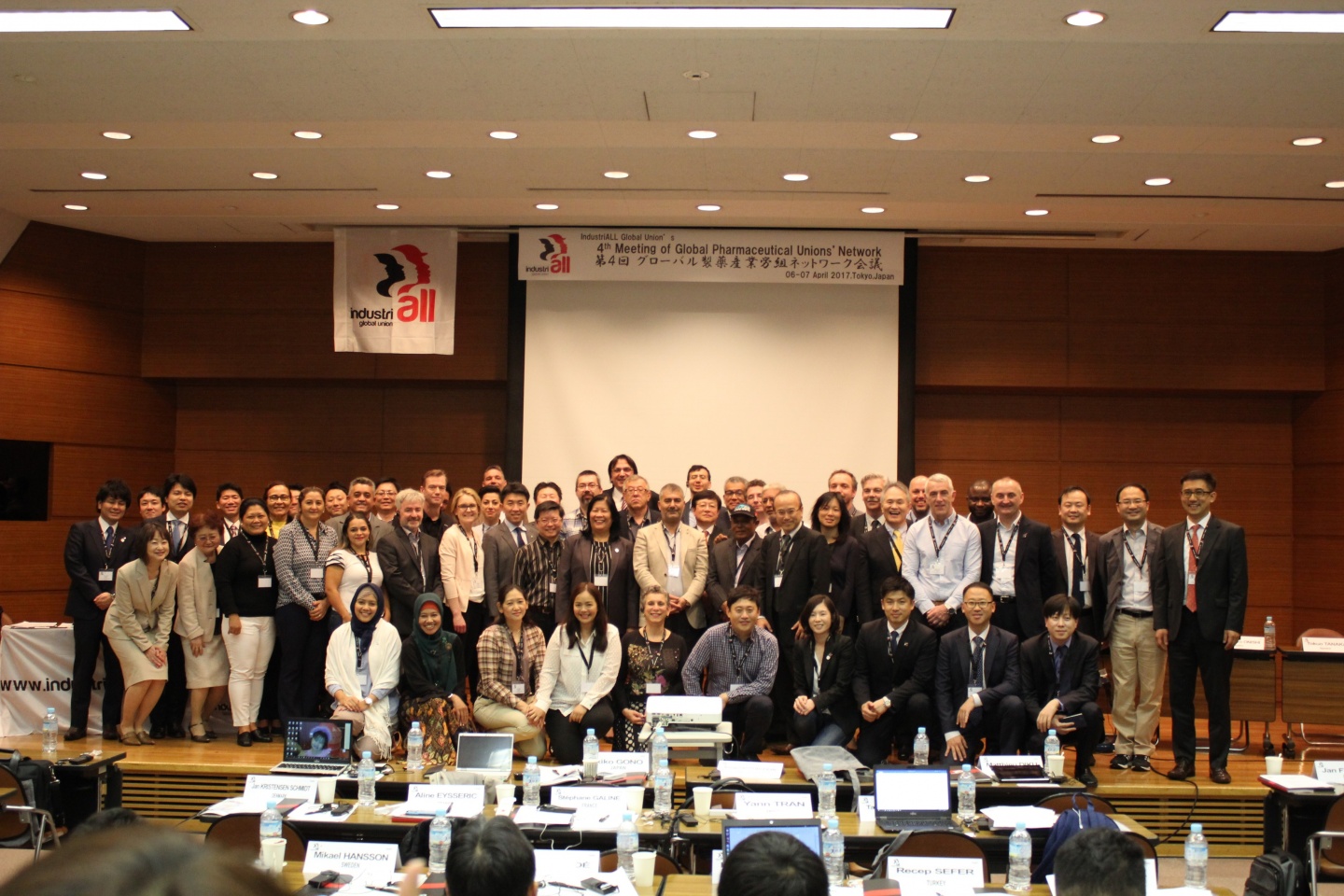12 May, 2017Around 120 trade union leaders representing pharmaceutical industry workers in 17 countries debated current and future challenges for workers in the industry.
Union delegates joined the fourth meeting of the IndustriALL global pharmaceutical union network on 6-7 April 2017 in Tokyo, at the invitation of the Federation of IndustriALL Japanese Affiliates in the Chemical and Energy Sectors (IndustriALL-JAF).
The meeting welcomed interventions from the Economic Affairs Division Health Policy Bureau of the Japanese Ministry of Health, Labour and Welfare, and the Japanese Pharmaceutical Manufacturers' Association, about current developments in the industry and labour relations in the country.
Participants analyzed the global pharmaceutical industry, which is currently volatile, but expected to continue to grow in 2017.
Healthcare spending is rising and the need for medicine grows. As the middle class expands in developing countries and the global population ages, the industry shows huge potential. In the meantime, due to the high prices of many drugs, there is a rising demand for generics.
Organizing and bargaining policies were among the main items discussed in the meeting.
Japanese participants underlined current challenges, such as pressure on drug expenditure, reduction in staff and decline in employment. They pointed out the need for policy coordination, membership awareness, unity building, and organizing non-union plants with concrete targets as their union strategy.
In Brazil, union density was reported to be around 25 per cent, one of the highest, bringing quality social dialogue between unions and employers. Brazilian participants reported achieving through collective bargaining a 40-hour working week, 180-days maternity leave, particular provisions for access to medicine and opportunities for union representatives for access to workplaces.
As part of IndustriALL’s sustainable industrial policy programme, innovation and the effects of digitalization and Industry 4.0 were debated. The meeting noted digital transformation in the sector, particularly with a shift towards global inventory management and the unlocking of artificial intelligence, big data and cloud technologies.
Participants evaluated the impact on employment as industry changes with new methods of utilization of medical records, creation of different business networks and a new phase of ICT implementation.
The Swedish experience showed that automatization does not mean that jobs disappear. The consequences of digitalization for labour appear to be extended tasks, compressed schedules, seamless work and greater autonomy, while requiring significant skills development.
In France, digitalization brings both richness and illusion. The acceleration of research cycles is expected to bring a new era to research and development, which is an important segment of the pharmaceutical industry. Personalized medicine and focused therapies, and their potential impacts on employment, will be on the agenda of unions in the coming period.
Repression and pressure against unions in South Korea, Turkey, and Brazil was discussed in the meeting, and participants expressed their support and solidarity with ongoing struggles.
Outsourcing and agency work was identified as a major problem, particularly in countries such as Indonesia, Bangladesh and Pakistan, where 90% of the workforce was reported to be precarious. Access to medicine, and unions’ responsibilities, were underlined by the participants.
Global and regional level company networks were explored, and the examples of Sanofi and Takeda were analyzed in detail. Participants from France, Japan and Brazil shared their experiences of union networks, with exchange of information and experience and solidarity at times of difficulty in different countries.
The meeting applauded the determination of creating a global union network for Sanofi, following the positive experience with regional networks in Asia Pacific and Latin America. The first global Sanofi network meeting is planned to take place in December 2017.
“Commitment, determination and energy of our global pharmaceutical union network has begun to produce its result for global solidarity in this sector,”
said Kemal Özkan, assistant general secretary of IndustriALL Global Union.
“Given the particular difficulties in the sector, our efforts will continue to build union power in the pharmaceutical sector worldwide with more organizing”.










